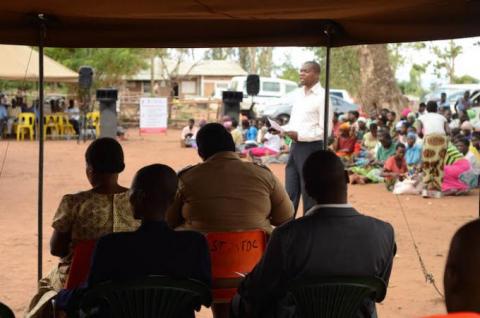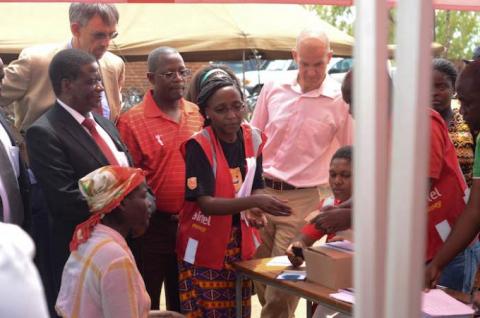Cash Transfer – Saving Lives and Building Household Resilience
This year marks the third consecutive year that Save the Children is implementing unconditional Cash Transfers to vulnerable households in key areas that are predicted to experience chronic food insecurity. The launch for the 2014/15 Cash Transfer Programme (CTP) took place on the grounds of St. Martins Primary School in Zomba District on 22nd December 2014. In attendance were the Guest of Honor, Pual Chiunguzeni the PS for the Department of Disaster Management Affairs (DoDMA), Member of Parliament (MP) for Zomba Thondwe, Hon. C.J. Tikhiwa, Irish Aid’s, Aidan Fitpatrick, Airtel Money Country Director, Francis Matseketsa, Save the Children’s Country Director, Matthew Pickard, OXFAM Country Director, John Makina, Christian Aid Country Director, MacDuff Phiri, Cooperazione Internazionale (COOPI) Head of Mission, Antonio Armentano, Mr. Chirwa, representing the District Commissioner for Zomba and Traditional Authority (TA) Chikowi. There were also other representatives from INGO partner staffs, guests, and most importantly, the beneficiaries who would be receiving the cash transfers on cellular phones using Airtel’s, Airtel Money system.

Photo Caption: Save the Children’s, James Lwanda opening the launch for this year’s 2014/15 INGO Consortium’s Cash Transfer Programme
In response to the Malawi Vulnerability Assessment Committee’s (MVACs) 2014-2015 National Food Security Forecast, Save the Children is leading a consortium of NGO’s consisting of Oxfam, GOAL Malawi, Concern Worldwide, Concern Universal and Christian Aid with funding from Irish Aid, The Royal Norwegian Embassy and Save the Children Italy. MVAC estimated that 640,009 people from 19 districts will be food insecure – which prompted the consortium to intervene in 10 of those districts. The INGO consortium is targeting an affected population of 242,781 people in the 10 districts representing 66% of those to be supported by the cash transfer based response this year. The remaining cash transfers will be targeted by WFP including a 100% food based response.
Cash Transfers are not your typical food hand out in times of a disaster. As alluded to by the term, they are transfer payments of money to households who are deemed vulnerable because of circumstances such as not having essentials like adequate food and able-working bodies, amongst other lacking necessities. Cash Transfers have an advantage in that they not only meet the immediate needs of households, but they also inject growth into local economies by virtue of having choice – which is the rationale behind ‘unconditional’ cash transfers.
The Cash Transfer Programme works as follows; beneficiaries are identified through community-based committees consisting of members from the Village Civil Protection Committee (VCPC), faith-based groups and village leaders using an agreed criterion to identify vulnerable households in their communities. The identified beneficiaries go through group verification and door-to-door verification to validate the list and to minimise the risk of “elite capture” in the targeting process. They then receive a mobile cellular phone as a modality for receiving the cash as “E-Value” and are able to cash out from agents within their location when they need the money. Having a phone in the programme enables beneficiaries to access information, submit feedback or complaints, participate in project monitoring surveys, send or receive money from other accounts, or purchase goods from stores/traders who accept Airtel Money. With training from Airtel, beneficiairies are quickly accustomed to the phones operating platform and as witnessed from the consortium’s previous experience, even those with literacy or numeracy constraints have been able to learn how to quickly use the Airtel Money system.
Given that certain households are vulnerable to food insecurity year after year, the programme’s objective is to address immediate food security needs. However, the consortium felt strongly that some level of resilience building should be incorporated into the response through equipping families with knowledge and skills that will enable them to improve their economic situation and reduce vulnerability to future shocks. The 2014/15 INGO Emergency Cash Transfer Programme is also prioritising linking beneficiaries to Village Savings and Loans Associations (VSLAs), information about good nutrition practices targeting children in particular, and, where possible, integrating beneficiaries into long-term development initiatives run by partner INGOs, UN agencies, the Government of Malawi (GoM), or other actors. The need for linking CTP and programmes alike to key initiatives is what Aidan Patrick of Irish Aid believes is a good approach to combatting food insecurity. “Malawi needs better linkages between all the big national programmes including the Farm Input Subsidy programme, the Malawi Venerability Assessment Response and the Cash Transfer programmes and with this in place, the country can manage I hope move out of this chronic food challenges,” he said.
Facilitating these linkages will enhance the sustainability of the intervention as already revealed by the recent 2013/14 INGO Cash Transfer Impact Evaluation report where two-thirds of the beneficiaries joined VSL groups and by the end of it, just over half were still participating. Of those participants, 38% who took out loans used their money to buy household food items, 33% using it to establish businesses and 5.6% invested on agriculture. The success of VSLs in enabling resilience will require beneficiaries to put their money in things that will generate income and provide sustenance as opposed to mainly spending it on temporary household goods.
When asked about the theme for this year’s programme, Save the Children’s, James Lwanda said, “we aim to save lives, build household resilience and maintain dignity through the Cash Transfer Programme.” In support of this goal, VSLs aim to do just that. They build capacity of target communities to be able to mobilize savings, use these savings to start a loan fund and to create a social fund for relief of members experiencing emergencies. What’s more, they allow people to be self-sufficient!

Photo Caption (Left to right): Aidan Fitzpatrick (Senior Development Specialist, Irish Aid), Paul Chiunguzeni (PS for the Department of Disaster Management Affairs) Francis Matseketsa (Country Director, Airtel Money) and Matthew Pickard (Country Director, Save the Children) observing a beneficiary cashing out with an Airtel agent.
Save the Children Director, Matthew Pickard during the launch said, “cash has a critical role to play both in meeting food requirements but also in stimulating the local economy.” As cash transfers induce a multiplier effect – the belief is that through VSLs, they too can provide the same, but in the process, provide security to communities at large. With Save the Children being an organisation that takes pride in imparting immediate and lasting change, it is no surprise that it has taken precedence in building resilience within the Cash Transfer Programme – aiming at providing a more sustainable approach to humanitarian assistance. With the programme now running on its third year and having learned from its past experiences, it will be interesting to see what results come out of the INGO consortiums CTP – particularly in relation to VSLs, being a key initiative in the programme.
It is safe to assume to that most people do not want to continually depend on aid – but rather, would prefer having economic empowerment. The same would go for stakeholders who provide aid and their hopes for its recipients. All in all, the direction the Cash Transfer Programme has taken shows positive signs of the desire and need to empower people. It shows that there is a linkage between the goal of eradicating extreme poverty and hunger (MGD1) and the concerted efforts in implementing disaster risk reduction – resilience being the common theme.
Written by Luzayo Nyirongo, Strategic Communications Officer
Edited by James Lwanda, Senior Manager Humanitarian Affairs
 Malawi
Malawi